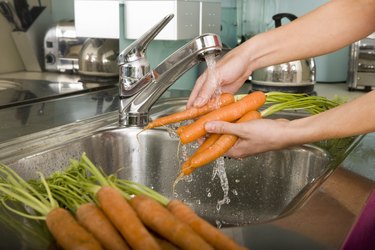
Bad bowel movements mean one of two things: diarrhea or constipation. Diarrhea consists of sometimes-uncontrollable loose stools. Constipation occurs when food packs up in your colon and won't move easily. High-fiber vegetables such as carrots may help your bowel movements in both cases. However, if you have a specific medical condition you should consult your doctor or nutritionist before making any big dietary changes.
Fiber
Video of the Day
Carrots, both raw and cooked, contain fiber. Insoluble fiber is more important for bowel health than soluble fiber. Insoluble fiber helps add shape to your stools. It moistens hard, impacted feces by binding water in the gut. Fiber also firms up loose stools by adding extra bulk and mass. In both cases, these help your bowel movements become more regular and comfortable. You get less of the pain of constipation and less of the discomfort of diarrhea.
Video of the Day
Carrot Fiber Content
Carrots offer a good natural source of dietary fiber. One fresh 7 1/2 inch carrot contains 1.2 g of insoluble fiber and 2.3 g of fiber overall, according to the Harvard University Health Services. Half a cup of sliced and cooked carrots contains around 0.9 grams of insoluble fiber, or 2 g in total. As a guideline, an average adult male should aim for 38 g of fiber from food each day. An adult woman needs less, around 25 g each day, according to experts at Colorado State University Extension.
Usage
Though carrots will help bulk up stools or improve bowel conditions, they're not a medical cure for constipation. Instead, they work best when included as part of a high-fiber diet and eaten regularly over time. A popular fiber drink sachet designed to treat constipation offers a single dose of fiber per serving at 3.5 g, around 80 percent of which is soluble fiber. However, these remedies contain husks that swell with water and bulk up your stools. While a cup and a half of cooked carrots may contain a similar amount of total fiber, they won't have such an immediate effect on your bowel movements if you're feeling constipated.
Considerations
If another medical condition triggers your bowel problems, then carrots may not be the best solution. For example, people with Crohn's disease may struggle to digest properly carrots and other vegetables. Eating more carrots isn't going to help the situation. If you have diarrhea, you may also need to replace lost fluids. The University of Maryland Medical Center suggests drinking carrot and celery juice to restore the balance of body electrolytes.